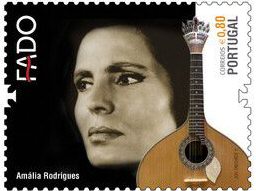Introduction to Fado
Alfama and Mouraria
Fado (IPA phonetic transcription: 'fadu or 'fadŭ) is Portugal's best known musical form. There is written evidence dating back to around 1840 when it was developing in Lisbon, most notably in the taverns and other entertainment establishments of the city's old districts of Alfama and Mouraria. Whereas nowadays, Fado can often be observed treated with reverence, general Portuguese public perception throughout its history was not always as favourable; initially tainted by social disdain, and later complicated by political misconceptions and distrust during the dictatorship.
A Typical Fado Song
A typical Fado song features poetic - often introspective and melancholic - lyrics combined with a plaintive modal melody. The singer may be accompanied by the distinctive-sounding 12-string Portuguese guitar and a classical guitar («viola», or «violão») and additionally an acoustic (or an electric) bass («baixo»). Percussion instruments were mostly absent but are heard more often today. The finest performances are distinguished by the compelling combination of subtle virtuosity and raw emotional intensity.
Amália Rodrigues

The towering figure of 20th Century Fado was Amália Rodrigues who, following early national success in the 1940s, became the first Fadista whose fame transcended the Portuguese-speaking world. Her death in 1999 instigated three days of official mourning during a Parliamentary Election campaign. Her influence - both musical and stylistic - continues to this day.
Mariza
 Mariza was born in Moçambique and moved with her family to Lisbon at the age of three. Among the many talented and charismatic contemporary female Fadistas, Mariza is featured in this brief introduction because of her international profile, awards, and exceptional album sales throughout the years since her 2001 debut album «Fado Em Mim». Whilst most respectful of Fado traditions, she has also innovated and incorporated wider influences in her music.
Mariza was born in Moçambique and moved with her family to Lisbon at the age of three. Among the many talented and charismatic contemporary female Fadistas, Mariza is featured in this brief introduction because of her international profile, awards, and exceptional album sales throughout the years since her 2001 debut album «Fado Em Mim». Whilst most respectful of Fado traditions, she has also innovated and incorporated wider influences in her music.
Text copyright © 2011-22 fadoconcerts.com